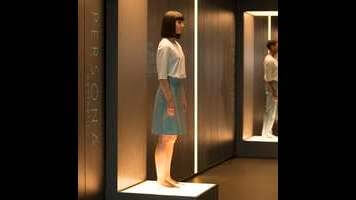Like its technology, Humans delivers more depth than advertised

It’s a familiar premise: When human-like androids become widespread, serving as household assistants, menial laborers, or sex workers, humanity has to grapple with what it means to be truly human. Humans could be as rote and vacant as its AI, referred to as “Synths,” are believed to be. Instead, this English-language remake of Sweden’s Real Humans is uncannily well-crafted, with an undercurrent of emotional depth that is occasionally surprising, even gratifying.
Humans is aware of its predecessors. As in A.I.: Artificial Intelligence, William Hurt plays an early architect of intelligent robotics, and he treats his own android more like a son than a servant. Blade Runner fans will find the words “basic pleasure model” ringing in their heads as Synth sex workers are shown blank-faced in alluring poses. The head of a Synth chop-shop is named for Karel Čapek, who coined the word “robot” in the play R.U.R. But the show isn’t preoccupied with its place in the genre. It makes a few knowing allusions and proceeds to tell its story with compelling simplicity.
Poorly written characters are often described as “sketched out,” but a series of sketches is exactly what Humans offers in its auspicious beginning. The opening episodes draw characters and situations in a few quick strokes, but these deft sketches are enough. Dr. George Millican (William Hurt) is a crabby old widower whose obsolete Synth, Odi, is both his surrogate son and his proxy memory, a repository of details and stories now beyond George’s failing abilities. Laura Hawkins (Katherine Parkinson) is suspicious of the new Synth her husband brought home while she was away on yet another business trip. Mia (Gemma Chan) is the refurbished Synth he bought, who harbors a secret spark of consciousness. Flashbacks show Mia on the run with Leo (Colin Morgan), who now leads Synths Max (Ivanno Jeremiah), Niska (Emily Berrington), and Fred (Sope Dirisu) in a search for her, and for a place they can call home. There’s a graceful precision to the interweaving of stories; what could be a muddle is instead executed with clarity.
Humans isn’t subtle. Characters exchange glib philosophy without looking for answers. “Do you think we love our children because we choose to or because we have to? Are we hardwired to love them?” Laura asks her husband, Joe (Tom Goodman-Hill) after their new Synth puts their daughter to bed. Mattie (Lucy Carless), Laura and Joe’s brilliant teenage daughter, reminds them that in a society where all her future ambitions are flawlessly performed by Synths, “My best isn’t worth anything.”
The Synths, too, turn subtext to text. Seeing Niska, his self-aware Synth sister, in the chamber where she performs sexual services on command, Leo asks, “Did you turn off your pain like I told you?” “No,” she retorts, “I was meant to feel.”
That frankness doesn’t mean the series is without nuance. Humans explicitly poses some ethical and emotional questions, but it hints at knottier ones left unexamined by its characters. Leo, who’s made it his mission to save from slavery the “special” band of Synths his father instilled with self-awareness and emotion, assumes the role of leader when they’re together. At first, they follow him without hesitation, though they’re often savvier and better at navigating dangers than he is. Leo’s presumption—that he’s the natural leader, that other Synths don’t merit saving—suggest his unexamined bias.
Sparks of humor leaven the drama as well as the philosophy. William Hurt’s irascible energy works well here as he snaps out nicknames for his severe government-issued android nurse or hams up a phony shoulder injury to distract her from Odi’s antics. Toby Hawkins’ (Theo Stevenson) attraction to the family’s beautiful new Synth expresses the clumsy yearning of teenaged boys everywhere in a scene both tense and hilariously awkward. Humans interrogates what it means to be human, but it already understands how to portray humanity in all its silly, sordid efforts.
The body language of the self-aware Synths also creates an uneasy comedy, as they shift from public blank formality to the more relaxed demeanor they use in private with Leo. Ivanno Jeremiah portrays this change silently in several scenes, and the contrast makes his sudden human naturalism feel unnatural, even eerie, as well as weirdly comical. Niska’s transformations are more brutal, both shocking and bleakly funny, as she upends men’s expectations of her docility, including Leo’s.
Just after activating his Synth, Joe turns to his small daughter and asks, “Now what do we do?” That’s the question for this eight-episode series. In the first two episodes, Humans looks like a promising excursion into familiar territory, and one that plays well on several levels. It’s a domestic drama, a sci-fi thriller, and a meditation on alienation, all wrapped up in one sleek package.